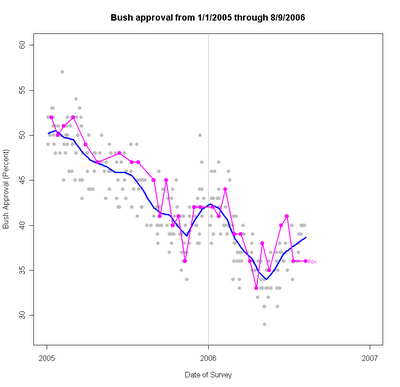
A new Fox poll taken 8/8-9/06 finds approval at 36%, disapproval at 56%. That is no change in approval from their previous poll of 7/11-12 but a 3 point increase in disapproval. With this addition my estimate of the approval trend is adjusted down to 38.7% from 39.0% as of 8/6.
It is great timing to have this and the CNN/ORC and ABC/Washington Post polls from late last week and the weekend just prior to the British terror arrests of this morning's news. This will give us a strong baseline to assess any effect of the terror arrests on approval or the structure of attitudes. Unfortunately, the timing of the arrests also means that any effects of Lamont's win in CT on national public opinion will be hopelessly confounded with the arrests. Damn.
The Republicans appear to see an opportunity in Lamont's win to paint him and the Democratic party as soft on terror. This strategy, which links Iraq to the "War on Terror" and argues that Democratic support for troop withdrawals can be translated into weakness on terror, seeks to exploit the President's remaining (relatively) strong card in public opinion. Approval of the President's handling of "the U.S. campaign against terrorism" was measured 8/3-6/06 by ABC/WP as 47% approve, 50% disapprove. Since January the approval rate has been 53, 52, 52, 50, 53,51 and now 47, a mild decline. But this at a time when overall approval was sinking into the mid-to-low 30s. So while far from the ace of trumps this issue once was, it remains the high card in the White House's hand. Apparently the party thinks this issue still holds the key to victory in the fall. Now events have unfolded to raise the salience of the terrorism issue once again.
Liberal Democrats, energized by the stunning success of Lamont in capitalizing on the Iraq war issue to unseat a seemingly safe incumbent, were looking forward to renewed criticism of Bush from the timid among their national leaders. The tactical question now is how to push that criticism of the (at least) mishandled (and at most unjustified) war without playing into the Republican strategy of making Dems look weak on terror. Expect Republicans to stress the link of Iraq and Terror in every speech.
Thanks to the timing of recent polls, we should at least be in a good position to measure how these latest developments play out in public opinion.
-----
On a different subject, in a comment here, Alexis asked about the Fox poll performance recently:
Fox has Bush at 36% again, exactly the same approval in their last poll from last month (although the disapproval rate is up three points). Didn't Fox use to have a significantly positive 'house effect'? How do you explain the fact that they've been consistently below trend as of late? Has there been any change in polling methodology or wording that you know of that could account for that?So I thought I might answer that here rather than in the comments of the earlier item. The plot above shows that Fox has tended to be a little above the trend line though with a few below trend also. The last time I updated the "house effects" estimate in late April, Fox came in at +.72%, with a confidence interval from -.02 to +1.46. That puts Fox only one spot above the median across the 22 polls for which I have estimated house effects. The mean house effect is constrained to be zero in my estimates.
The Fox poll is often mischaracterized as strongly biased in a pro-Bush/Republican direction. At least on the approval question, that is not the case. Democratic pollster Stanley Greenberg's firm, for example, has a +1.83 house effect estimate and ABC/WP has a +1.29 estimate. Likewise other polls have considerably larger house effects in the opposite direction: CBS/NYT -1.87, Newsweek -2.18 and Pew -2.32.
Since January 2005 Fox has done 30 polls, 20 of which were above the trend and 10 below trend. The last two are a little below trend. This most recent is 2.7 below trend (-3 if you exclude this case from the calculation of trend.) That isn't large, relative to the variability of polls. Over the 1180 polls since Bush took office, the 80% confidence interval around my trend is -3.64 to +3.42. The 90% CI is -5.12 to +4.2. So by that standard, the current residual for Fox of -2.7 (or -3) is quite small. Given the small house effect, and the variability, it isn't that unexpected that we'd see two Fox polls in a row that fall below the trend.
So far as I know there have been no changes to Fox methodology of late. But I don't think we need to worry too much about the issue. So far, at least, there is little statistical reason to think that the behavior of the Fox poll has changed.
Click here to go to Table of Contents